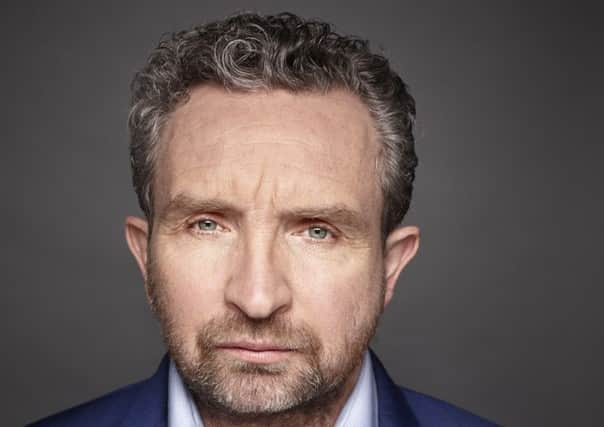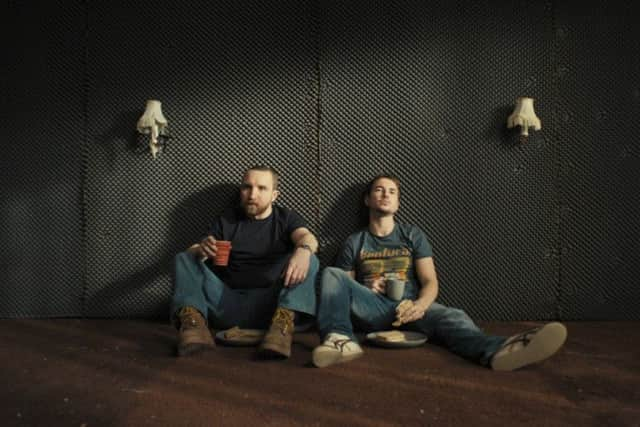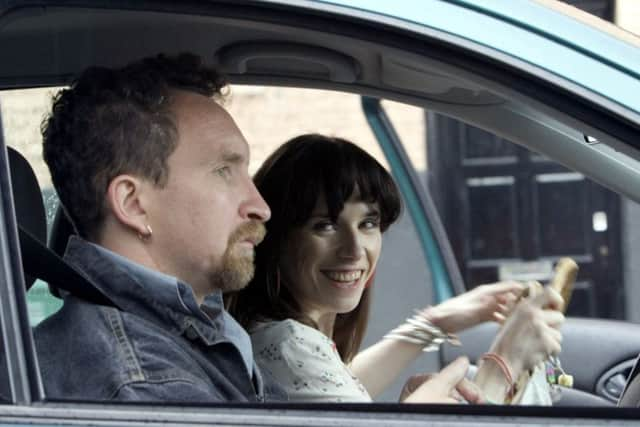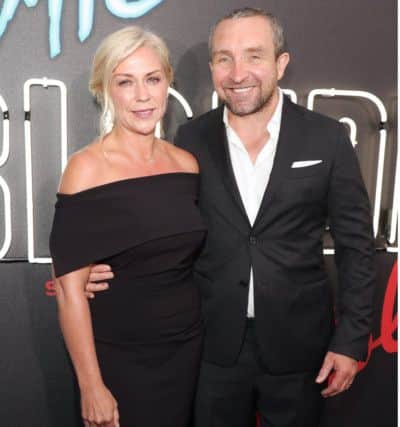Interview: Eddie Marsan


Eddie Marsan is one of those “ehhhh, oh yeah him, he was absolutely brilliant in...” guys. Mention him to anyone, then prompt them with Vera Drake, Gangs of New York, The Disappearance of Alice Creed, Still Life, The World’s End, Filth, Ray Donovan, Entebbe, and many more over a 20 year career, and the response is always the same. We love Marsan.
He’s a character actor with many faces, multiple personae, possessed of a mercurial quality that makes you want to keep on watching. He’s one of those actors who can nail the complexities, from vulnerable to violent, everyman to eccentric one-off and everything in between, which is why he’s worked with some of the best directors in the business, from Scorsese to Spielberg to Woody Allen to Mike Leigh three times (Vera Drake, Happy-Go-Lucky and A Running Jump).
Advertisement
Hide AdIt’s also why he’s never short of work, with Deadpool 2, Mowgli (Andy Serkis’s live-action fantasy in which he plays Vihaan the wolf), the true crime White Boy Rick with Matthew McConaughey, Emperor alongside Adrien Brody, and Entebbe all out this year, with more of Showtime’s hit crime drama Ray Donovan in the pipeline. Last year saw him in Atomic Blonde with James McAvoy and Charlize Theron, Their Finest, The Limehouse Golem and Mark Felt: The Man Who Brought Down the White House.


“Yeah, I think I’m a workaholic,” he says, on a rare break back at home in West London. “I work like crazy and don’t really have a social life. I work, then come home to the wife and kids.”
He has four, ranging in ages from seven to 13 with Janine Schneider-Marsan, a make-up artist and artist he met when she made him up as a pig on The Lost Kingdom, although you could be forgiven for thinking he was in fact married to Scots actor Shirley Henderson, since they’ve played husband and wife five times. “Yeah, we’re always husband and wife, but different characters each time,” he says.
Back home in Chiswick with his real wife, he’s on a break from filming Ray Donovan in the US, and promoting his latest film, the superhero X-Men series Deadpool 2 with Ryan Reynolds.
What can he tell us about it? He laughs.


“I’m the totty. I’m the sex appeal. I’m not really, but that’s what I say when people ask about Deadpool 2. Because I can’t tell you anything about it,” he says.
“I can tell you how it came about, which is David Leitch is a big fan of Ray Donovan, so through that I worked with him on Atomic Blonde then he asked me to do Deadpool 2. But I can’t say anything else, so I say I’m the totty.”
Advertisement
Hide AdThis self-deprecation prompts a why shouldn’t you be the totty response to the subtle demotion of the likes of Marsan in the movie universe. Beefcake’s boring, I tell him, whereas Marsan plays real people you would actually think about… OK, I’m starting to sound weird... Marsan laughs.
“No, I understand,” he says. “The parts I play, they’re more the way human beings actually are, than the way we wish we were. Quite often beefcake are what we wish we could be, and they’re quite bland. The parts I play are more studies in human nature. And where I grew up there were lots of scary people and I was quite scared of them, so I’m very good at playing cowards and I’m very good at playing violent people too.”


Advertisement
Hide AdIn the US he’s a regular on Ray Donovan about a fixer for LA’s movie movers and shakers, playing Ray’s brother Terry, an ex-boxer suffering from Parkinson’s disease, alongside Liev Schreiber and Jon Voight.
“You think it’s about the glamour of Hollywood then you realise it’s about three brothers who have all been sexually abused by a Catholic priest. They can’t articulate the pain so they do it in dysfunctional ways, through violence and drugs or whatever. It’s a fascinating family,” he says.
Ray Donovan is a US hit, now in its sixth series, yet in the UK Marsan is still somewhat overlooked and says he rarely gets offered any television work here.
“I do Ray Donovan for six months of the year and all of the other jobs are in America now. I would love to work here, but I’m kind of out of the loop.”
“I suppose I just fall through the cracks,” is how he puts it. “I don’t think I’m the typical working class East End actor.”
Recently, after working in the US on the Dick Cheney film biopic Backseat with Christian Bale and Steve Carell and the last series of Ray Donovan, he asked his UK agent about work.
Advertisement
Hide Ad“They said the BBC are doing Richard III and they’re going to offer you a part. I thought, great, fantastic, bear in mind that I played Richard III, toured Europe for a year... then when it came through it was a thief with two lines. I’d been in Ray Donovan, studied Parkinson’s, the Boston working class accent, boxing… I thought, the Americans think I can do anything, and the British see me as a thief with two lines. So that’s why I don’t work much in the UK.
“I was in the US making Backseat and the BBC are going to offer me second villain, not first villain, in Doctor Who, and you just think, ‘I can’t be bothered.’ Don’t get me wrong, I’ve nothing against Doctor Who, but I just wanna do good work.”
Advertisement
Hide AdMarsan has also just finished filming Feedback, about a London radio host whose studio gets hijacked by armed men.
“I like to do films about London made by foreign directors because they avoid the cliché of what I call Cockneys on coke, where you’ve all got double barrelled shotguns. I find them stupid,” he says. “I like foreign directors, for example, I did Still Life with the director Uberto Pasolini – that won a prize at Venice, and Feedback is a bit like that.
“I don’t have this romantic view about the white working class. For a long while I was trying to work out what my tribe is because I came from a very, very working class background and yet I worked with a load of people from a more privileged background. People thought I should always remember where I’d come from, but I realised that my tribe is curious, open-minded people; I’m not defined by class. I’m defined by character. Because there were lots of really horrible people, racist thugs where I grew up, and ignorance was celebrated, so I’m not going to sit around and say yeah, I remember, because I didn’t come from them. I succeeded in spite of them. It gets me into trouble, but I don’t have this romantic view of any class, I judge people by character.”
Apart from Deadpool 2, which caused his kids to consider his work cool for the first time, there’s also Mowgli and White Boy Rick due out this year.
“White Boy Rick is a true story about a white boy growing up in Detroit who was selling drugs in a black area and became an informant for the FBI. He was arrested at 16 and he’s still in prison there now in his mid 40s. It’s a fascinating story, a great injustice.”
Did McConaughey stay in character as White Boy Rick’s father during the shoot, as he is wont to do?
Advertisement
Hide Ad“No! No,” says Marsan. He’s very sweet, very nice. We sat around and talked about kids. All actors of a certain age talk about kids, how do we raise them in this crazy business? I remember I worked with Philip Seymour Hoffman on God’s Pocket. (I’d known him for about ten years since working with him on Mission: Impossible 3), and that’s what we talked about, kids. And then he died about six weeks later, and it was really sad. So that’s all actors talk about, how to make it all work.”
Marsan does his best to make it work by following the early career advice of his Russian drama teacher: “The trick is to have a normal life and an extraordinary career.”
Advertisement
Hide Ad“It’s true, that’s the trick,” he says. “My wife and I work very hard to make their life as normal as possible and I come back if I have a weekend off, wherever I am.”
“My wife is more talented than me,” he says. “When we met she’d just done Lord of the Rings and was the successful one, so I married her for her money. She’s a great prosthetic make-up artist – when they asked me to play Bob Dylan in one of those Urban Myths, she did a great job making me up as Dylan – but she wants to spend time at home with the kids at the moment.”
Born in Stepney in 1968, Marsan grew up in Bethnal Green in a working class family, the son of a lorry driver and teaching assistant, with a nan who worked as a cleaner until the year before she died at 89. He left school at 15 with no qualifications – “my old man wanted me to leave school and get a job” – and became an apprentice printer, a job that didn’t particularly grab him.
But two factors intervened that made his life take a different route. Dance and becoming a Born Again Christian.
As a kid in Bethnal Green, Marsan and his mates would spend Sunday afternoons dancing to Northern Soul, or “rare groove” as Marsan prefers – “it has a slightly different beat” – in Camden Town, Marsan in his two button second hand suits, pocket handkerchiefs and silk ties.
As well as a legacy as a snappy dresser, his love of rare groove led to him being an extra in Empire State, a 1987 film about the power struggles around the Docklands regeneration.
Advertisement
Hide Ad“Most of my friends were St Lucian and we used to go to clubs and I was quite a good dancer. Some guy saw us and asked us to be extras and I saw an actor doing a scene and thought, ‘I could do that.’ It just occurred to me, and that was it.”
So Marsan went to drama school, paid for by the bookie that he worked for on top of his printing apprenticeship, and six years after he graduated in his early 30s, the work started to come in.
Advertisement
Hide AdBut back to the Born Again Christianity, where did that come from?
“My family weren’t religious at all,” he says, “but the brother of one of my friends became a Pentecostal Christian, and he was a very nice man and knew I was a bit lost and he took me to church. And then I just went crazy with it, cos that’s my nature. I’d be looking in the fridge and saying what would God want me to eat, what would the devil want me to eat? I got a bit binary.
“It was when I was studying printing and I went a bit fundamentalist. I had a kind of nervous breakdown I think when I was about 15 or 16. I’d finished my apprenticeship and they gave me a massive new machine and suddenly I thought ‘this is not for me’. I think there was a kind of existential angst within me.
“So I understand that kind of mindset, the fundamentalist, where there’s a voice outside making sense of it all so you don’t have to. And it gives you someone to blame, and when people face difficulties, it gives them a simple answer, someone to blame. I think this country is becoming more and more binary, and I think Brexit was a result of that.”
Marsan gave up on being a Born Again Christian after a few months but he’s still someone with strong convictions, many of which are expressed via Twitter.
“My wife says Twitter is my mid-life crisis, ‘cos I never went to university, it’s my debating society. It was Paddy Considine, after we’d made The World’s End, who said ‘come on, let’s get on this Twitter’ so I did.”
Advertisement
Hide AdMarsan doesn’t hold back with his political views, which are left of centre, the legacy of a childhood spent watching the National Front and the Anti-Nazi League screaming abuse at each other from either side of Brick Lane on a Sunday when he went to get the bagels and doughnuts.
“People say to me you don’t understand with the kind of life you live, but I don’t live a Hollywood lifestyle, I live in London. We sit round the kitchen table and have debates and arguments. Half of my family voted for Brexit,” he says. “Brexit broke my heart. My dad voted Brexit and he comes round every Sunday and brings Jewish bread from where he lives, and Mars Bars for the kids, and we sit and chat and it’s lovely. I was in Basildon yesterday seeing my mum – they voted Brexit. I can see why people needed to do something, the problems they are facing, but I don’t think the solution is Brexit. I think it will only make things worse.”
Advertisement
Hide AdIt’s clear Marsan loves to sit and debate, talk politics, discuss solutions, unlike the many of the roles he lands, complex creatures who struggle to make sense of the world.
“I always play characters who are full of thoughts but don’t know how to articulate,” he says. “Do you know what I mean?”
Recently, with his mum very sick, Marsan has been thinking about the past and how he came to pursue the career path he did.
“We sit round talking a lot, and I was thinking the acting came from a need in me to understand. And that need was fed by an anxiety. I was confused when I was young and needed to work things out for myself. I was the youngest of four, with three older sisters and my parents’ marriage was quite volatile and they divorced when I was 12. I grew up in a very, very multi-cultural, multi-racial area and most of my friends were black but a large proportion of the white people in my area were quite racist, so I was always trying to work out what the true point of reference was. I could never really adopt the white working class orthodoxy and I always had the curiosity for other cultures.
“I’m not academic, if you asked me to write an essay I couldn’t, but ask me to inhabit an idea on stage for two hours and I totally could do it. My ability is more visceral. So I think that what I was doing in trying to become an actor was to explore the way other people see the world, see through their eyes, and whether there was an answer there. Because I never found one growing up. I was very loved, very supported, but a lot of us kids were trying to find autonomy from it all, growing up on this estate where there were lots of fathers who had court orders not to come within a 100 yards of the house and lots of domestic violence and craziness, as well as a lot of laughter.
“And a lot of us did find autonomy, a lot of us became very successful in our lives, but not in conventional ways, ways you might expect. Do you know what I mean?”
Yes, we do, because like we said, watching the unconventional and complex is always way more interesting than watching the beefcake.
@JanetChristie2
Deadpool 2 is out on Tuesday